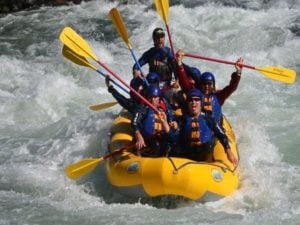Teamwork Skills in The Workplace
Does your team need additional teamwork skills in the workplace?
When I entered the world of fan-run conventions, I didn't know what to expect from a rag-tag band of volunteers. The Operations and Safety department at one popular con recruited my company, RS ConOps, to work with them years ago. My duties included grunt initiation: walking the grounds, guarding doors and going on food runs for the rest of the regular staff.

Over a short period of time, I quickly moved up in the ranks until I was placed in charge of the department, and quickly began to alter the dynamic of the crew to become the machine of stark efficiency they are today.
Teamwork Skills in the Workplace
Teamwork skills in the workplace: Unify communications
To keep the crew motivated, I used a lot of understand and behavior coaching. Especially relevant, I chose to unify everyone into a single team communications space: Slack. Through Slack we reached anyone at any time for anything. We instantly shared diagrams, map layouts, notes and thoughts with anyone on the team. No need for knowing user names or waiting until someone was online.
Teamwork skills in the workplace: Study behavior
The next steps required behavioral studies. I attended a few convention seasons as both a Supervisor and Department Head watching the camaraderie of my existing teammates. More specifically, I was looking for areas of expertise: customer service, memorization, command of respect, responsibility, caring, organizational skills, technical knowledge, nerd status, among other criteria. When I found where people fit in, I began creating positions that molded to the strengths of my team.
Teamwork skills in the work place: Delegate tasks
I found managing the team and delegating tasks are easier if one played to those strengths. Team members felt appreciated for their skills. The organization highly regarded positions like the grunts because of their inherent necessity. Therefore, we worked as a close unit to make sure that every member of the team felt themselves a vital component of the full departmental machine.
Teamwork skills in the workplace: Example #1
For example, the conventions have a dire need to feed people that are stuck at their roles and cannot get away for lunches and dinners. My own team members are often stuck at posts for hours where they cannot easily slip away. In addition, we didn't have people to immediately replace or relieve them. Seeing this, I created an entire sub-team. The sub-team goes around to all of those posts and departments to provide bathroom relief, a food-runner and delivery services, and offer snack bags and water deliveries. This team is placed below leadership in the hierarchal breakdown. The goal is to indicate how important the role is to the team.
Despite running around as essential gophers to the convention, the team felt the appreciation of their duties due to the high-ranking within the organization. This provides reassurance that grunts are actually quite important. In fact, they're in charge of the well-being of the rest of staff.
Teamwork skills in the workplace takeaway: EMPOWER
Using this method of position empowerment and delegation, my teams reached peak efficiency because they're proud of the tasks they do. They know how vital their sub-teams are to the organization and management as a whole. A micro-manager isn't able to offer this sense of empowerment and trust to complete the tasks.
Finally, we, as leadership, provide support to the team and a hierarchy for escalation. We solve problems they can't. We provide mentorship, training guidelines and lead by example. And, as leadership, we carry the burden of discipline when a few cannot contribute to the organization.
Teamwork skills in the workplace: Example #2
A month ago we had a memorial bonfire at the beach for a team mate that had passed of cancer. During the bonfire, a distraught mother walked up to our large group. She told us that her two-year old had wandered off. At this time, the team snapped into their convention security mode. They took a description and instantly dispersed to comb the area. The team found the kid three lifeguard towers away. They helped to return him and cooperate with beach authorities. I was proud of them. Everyone functioned as a unit.
Although I was proud of my team, I was prouder knowing that they felt confident in their abilities as individuals and as a unit. I didn't take any credit for their actions, I stood alongside them as an equal and thanked them for being amazing.
Lee has worked in various leadership roles since his early days at the Disneyland Resort and the Department of Homeland Security. Through these roles, his experience in the tech sector and his volunteer roles with non-profit fan-run organization conventions, he's gained valued perspective on what it takes to make a team efficient, successful and well-prepared to handle all the situations they are presented. Lee's hobbies include mystery and thriller-based fictional writing, playing the violin and blogging from the perspective of his 65-lb chow mix, Whitey. Link: http://leealmodovar.com

